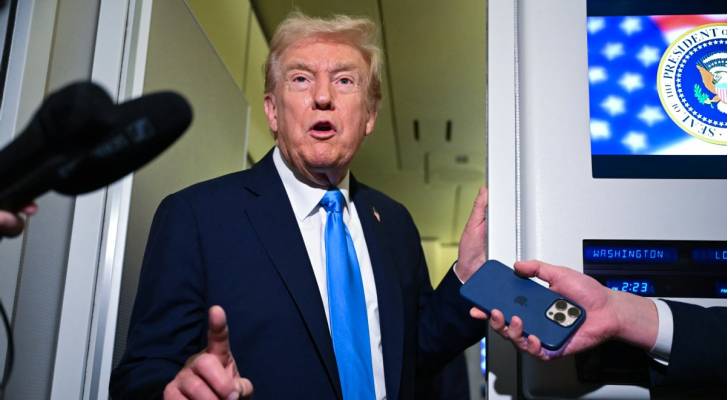US President Donald Trump (Credit: AFP)
Trump raises tariffs on Canada by 10% over "hostile" Reagan ad
President Donald Trump announced Saturday that he is raising tariffs on Canadian imports by an additional 10 percent, accusing Ottawa of a “hostile act” following the airing of a television ad that used remarks from former US President Ronald Reagan criticizing tariffs.
“Because of their serious misrepresentation of the facts, and hostile act,” Trump wrote on Truth Social, “I am increasing the Tariff on Canada by 10 percent over and above what they are paying now.”
The decision marks the latest breakdown in trade relations between Washington and Ottawa, just days after Trump abruptly halted negotiations with Canada on Thursday. The US president said he was suspending talks after learning about what he called a “fake” advertisement.
The ad in question, funded by Ontario Premier Doug Ford’s Progressive Conservative government, excerpts and rearranges parts of Reagan’s 1987 radio address in which the late president warned that protectionist policies could harm American workers.
“High tariffs inevitably lead to retaliation by foreign countries and the triggering of fierce trade wars,” Reagan says in the ad. “Then the worst happens. Markets shrink and collapse. Businesses and industries shut down, and millions of people lose their jobs.”
Although the ad reorders Reagan’s words, all the quotes are authentic. Ford announced Friday that the campaign would be paused starting Monday following a discussion with Canadian Prime Minister Mark Carney. However, the ad continued to run over the weekend, including during the World Series games between the Los Angeles Dodgers and the Toronto Blue Jays, something Trump later criticized.
“Their Advertisement was to be taken down, IMMEDIATELY, but they let it run last night during the World Series, knowing that it was a FRAUD,” Trump wrote Saturday, accusing Canada of trying to sway the upcoming US Supreme Court hearing on his tariffs. The court is set to consider on November 5 whether Trump’s use of the International Emergency Economic Powers Act (IEEPA) to impose global tariffs was lawful.
Speaking from Ottawa, Carney said Canada had no control over US trade policy but remained open to dialogue. “We stand ready to pick up on that progress and build on that progress when the Americans are ready to have those discussions,” he told reporters before departing for Asia.
Both leaders are attending this week’s ASEAN summit in Malaysia and the APEC forum in South Korea, but Trump made clear aboard Air Force One that he does not plan to meet with Carney.
Since returning to office, Trump has taken a hard line on Canada, repeatedly raising tariffs on goods such as steel, aluminum, and lumber, and even joking about making Canada the “51st US state.”
Kevin Hassett, director of the National Economic Council, said Friday that “Canadians have been very difficult to negotiate with” and that Trump’s “frustration has built up over time.”
Canada sends over three-quarters of its exports to the United States, leaving its economy vulnerable to shifts in US trade policy.
“Tariffs at any level remain a tax on America first, then North American competitiveness as a whole,” said Candace Laing, president and CEO of the Canadian Chamber of Commerce. “We hope this threat of escalation can be resolved through diplomatic channels.”




